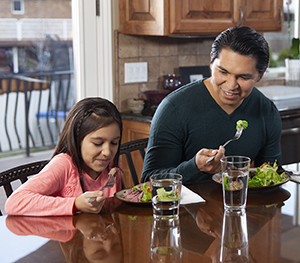When Your Child Has Cystic Fibrosis: Maintaining Good Nutrition
Cystic fibrosis (CF) can cause problems with the pancreas, liver, and other digestive organs. These problems can affect your child’s interest in food and the ability to absorb nutrients and fats. Good nutrition can help prevent some of these problems. It can also improve your child’s immune system and help fight infection. This all helps your child stay active. You’ll likely meet with a nutritionist 1 or more times a year to assess your child’s needs and make any changes. Your child’s healthcare provider will do regular follow-up tests to make sure your child is progressing with weight, height, and lung function.
Eating a healthy diet

Work with a nutritionist to figure out your child’s nutritional needs. Have your child eat as normal a diet as possible. But make sure it is varied and rich in protein and calories. Here are examples of foods to provide:
-
Fresh fruits and vegetables
-
Foods high in calcium, such as dairy products or juice fortified with calcium
-
Foods high in iron, such as fortified cereal, meat, and deep-green vegetables
-
Salty meals and snacks. People with CF lose a lot of salt through their sweat.
-
Foods high in zinc, such as meats, liver, eggs, and seafood
-
Foods high in fat. (Stay away from products listing trans fat on labels. Trans fat can increase airway inflammation.)
Adding calories
To maintain weight and slow the decline in lung function, your child will need to have more calories than a child without CF. The amount of calories needed is even higher when your child is ill or has an infection. Try for 3 meals plus 2 to 3 snacks a day. Here are examples of high-calorie foods to add to your child’s diet:
-
Butter
-
Cheese
-
Nuts
-
Avocado
-
Eggs
-
Whole milk (full-fat)
-
Peanut butter
If your child doesn’t gain weight or is behind on height, special liquid supplements may help add calories. If weight is still a problem, a nighttime tube feeding may be needed.
Replacing pancreatic enzymes
Your child’s pancreas may not make certain enzymes. This can cause intestinal problems, such as greasy, bad-smelling stools, urgency, frequency, cramping, and diarrhea. If not treated, it can lead to serious problems such as a bowel blockage, which can require surgery. For this reason, most children with CF need replacement pancreatic enzymes before every meal and snack. These enzymes help the body digest carbohydrates, protein, and fat, which promotes better absorption of nutrients. The healthcare provider prescribes these enzymes, which come in capsule form. Here are some general guidelines for giving your child enzymes:
-
For younger children, open capsules and sprinkle the contents on an acidic food, such as applesauce or pears. These enzymes don’t taste bad. Ask your child not to chew the sprinkles, because this will keep them from working well. To be sure your child takes them all, put the sprinkles on a small amount of food and watch your child eat them.
-
Older children can choose to swallow the capsules whole with liquid.
-
Have your child take the capsules with every meal and snack. Talk with your provider to figure out the correct dosage of pancreatic enzymes your child should take.
-
Make sure your child brings the enzymes to school and takes them with lunch and snacks.
-
Your child must take enzymes with liquid nutritional supplements, too.
Supplementing with vitamins
It's harder for a child with cystic fibrosis to get needed nutrition from foods alone. Your child may need to take vitamins once or twice a day, as directed by the healthcare provider. These include fat-soluble vitamins, such as vitamins A, D, E, and K. Vitamins are available in drops or as chewable tablets. Nutritional supplements, such as calcium, multivitamins, and sodium may also be advised when healthy eating is not enough. Ask your child’s healthcare provider how much to give your child and to suggest brands that are easy to absorb.
How to help your child
Putting too much emphasis on food can be overwhelming for your child. To avoid turning eating into a power struggle, try these tips:
-
Make food as appealing as possible.
-
In an age-appropriate manner, educate your child about cystic fibrosis. Encourage them to ask questions during healthcare visits.
-
Talk with teachers and school staff about cystic fibrosis and your child's unique needs. Seek reasonable accommodations that meet your child's needs.
-
Encourage your child to eat what they can comfortably. Don't pressure your child to eat more than they are able.
-
Don’t force your child to eat. Big portions can be hard to eat at one sitting. Try for smaller meals more often.
-
Keep to a schedule, but don’t make your child stay at the table for more than about 15 minutes at a time.
-
Eliminate distractions. Don't allow electronic devices, television viewing, toys, books, or games while eating.
-
Enjoy being together. Relax and sit at the table with your child.
-
Give younger children a few simple food choices.
-
Stay away from these possible choking hazards for children under 4 years old:
When to call your child’s healthcare provider
Call your child's healthcare provider right away if your child has any of these:
-
Constipation, belly (abdominal) pain, or other signs of an intestinal blockage
-
Weight loss or decrease in appetite
-
2 to 3 loose stools a day, or a change in the size or consistency of stools
-
New symptoms or symptoms that get worse
-
Fever of 100.4°F (38.0°C) or higher, or as directed by your child's provider
-
Increase in coughing, chest congestion, or change in the color of the sputum
-
Wheezing
-
Sudden shortness of breath
-
Chest pain or chest tightness
-
Coughing up blood from the lungs